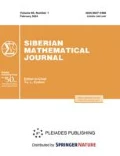Abstract
Let G be a finite group. It is proved that if, for every prime p, the number of nonidentity p-elements of G is divisible by the p′-part of |G|, then all element orders of G are prime powers.
Similar content being viewed by others
References
Higman G., “Finite groups in which every element has prime power order,” J. London Math. Soc., vol. 32, 335–342 (1957).
Suzuki M., “On a class of doubly transitive groups,” Ann. Math., vol. 75, 105–145 (1962).
Brandl R., “Finite groups all of whose elements are of prime power order,” Boll. Un. Mat. Ital., A, vol. 18, no. 5, 491–493 (1981).
Shi W. and Yang W., “The finite groups all of whose elements are of prime power order,” J. Yunnan Educational College, Ser. B, vol. 1, 2–10 (1986).
Shi W. and Yang W., “A new characterization of A5 and the finite groups in which every nonidentity element has prime order,” J. Southwest-China Teachers’ College, Ser. B. vol. 1, 36–40 (1984).
Deaconescu M., “Classification of finite groups with all elements of prime order,” Proc. Amer. Math. Soc., vol. 106, 625–629 (1989).
Kai Nah C., Deaconescu M., Lung L. M., and Shi W., “Corrigendum and addendum to ‘Classification of finite groups with all elements of prime order’,” Proc. Amer. Math. Soc., vol. 117, no. 4, 1205–1207 (1993).
Mazurov V. D. and Khukhro E. I. (eds.), The Kourovka Notebook: Unsolved Problems in Group Theory. 18th ed., Sobolev Inst. Math., Novosibirsk (2014).
Weisner L., “On the number of elements of a group which have a power in a given conjugate set,” Bull. Amer. Math. Soc., vol. 31, 492–496 (1925).
Author information
Authors and Affiliations
Corresponding author
Additional information
The second author was supported by the NSFC (Grant 11561021) and the third author was supported by the NSFC (Grant 11671063) and the Innovation Foundation of Chongqing (KJTD201321).
Original Russian Text Copyright © 2017 Buturlakin A.A., Shen R., and Shi W.
Rights and permissions
About this article
Cite this article
Buturlakin, A.A., Shen, R. & Shi, W. A characterizing property of CP-groups. Sib Math J 58, 405–407 (2017). https://doi.org/10.1134/S0037446617030041
Received:
Published:
Issue Date:
DOI: https://doi.org/10.1134/S0037446617030041


